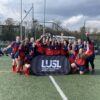Nearly all of you will have heard of the events surrounding the talk given by Ami Ayalon for the KCL Israel Society on the 19th of January and the involvement by KCL Action Palestine.
These events have triggered me to think about what ‘safe space’ at university really means, and whether as a University we are true to our union’s policy:
At KCLSU we’re committed to providing an inclusive and supportive space for all our student members. We believe all students should be free from intimidation or harassment resulting from prejudice or discrimination on the grounds of age, disability, marital or maternity/paternity status, race, religious beliefs, sexual orientation, gender identity, trans status, socio-economic status, or ideology or culture, or any other form of distinction.
The idea here is not only an excellent one, but also a morally upstanding one: people should be free to express themselves without any fear of being attacked for that expression. But we seem to have lost our way.
This article is not about taking sides. We are having the wrong discussion entirely if we focus on who was right or wrong that day Ami Ayalon was targeted. What we should be talking about is why these ideas have arisen in the first place. Why have we decided that opinions we don’t like should not be heard?
We need a space in which different opinions can be heard safely. For this, I believe King’s has to make changes, or, at the very least, uphold the values quoted in their policy.
This ‘space’ should not force societies at King’s to cancel events because its topic angers them, as has happened with a proposed debate from the KCL Atheist, Humanist and Secular Society. It should not deny speakers a platform unless they are directly insulting certain groups of people.
However contentious a figure like Ami Ayalon may be, the fact he was articulating his own point of view did not warrant the reaction he received from KCL AP or other members at the event on the 19th. Supporters of policies like Prevent might say that  his ideas are poisonous and spread ill-informed bigotry and hate. To me, that statement is fundamentally both an insult to and a refutation of human intelligence.
Particularly at universities, where academic standards of entry presuppose a high level of education, how can people assume that those who go to hear a contentious speaker are going to be instantly indoctrinated by anything said? I attend AKC lectures (which seems also to have come under fire recently) and listen to lectures about the ways in which people have tried to prove the existence of god, but I will notnecessarily come  out of those lectures believing in god.
The exact same thing goes for radical speakers. If we indeed want to live in a social democracy in which we are guaranteed certain liberties we cannot take them for granted. I argue that we have a duty to seek out new points of view, for in doing so, whether accepting them or refuting them, we strengthen the integrity of our position and make it more inclusive.
What our KCLSU policies have created, although in theory they consist of very admirable principles, is a system that is contradictory and twisted. We are trying to confront problems by not confronting them. Inculcating guilt in people will achieve nothing but anger, and drive groups apart that ought to be working together in a university.
Not only are there practical benefits to a restructuring of safe space policies along these lines, but there is a deeper and more philosophical one. It is, of course, the issue of free speech. There is no need to explain it here; you all know exactly what it entails, and how it is not only a vital part of a democratic society, but also one of the most important tools in allowing people to express themselves and thereby give themselves validation as individuals.
The beauty of humanity is that despite our competing individualities we are still able to work together, to live together, to help each other, and to love each other. Denying this with censorship is to deny an essential part of what it means to be a member of the human race.















